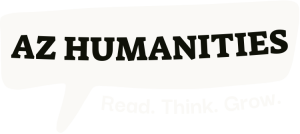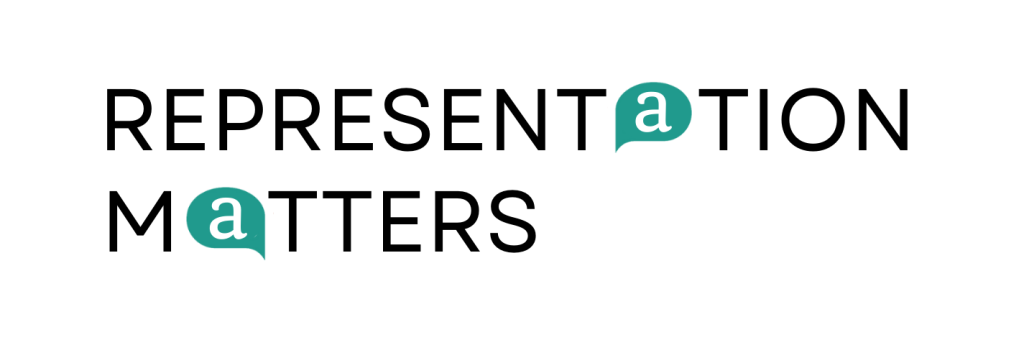
How can we be more civically engaged? Why does representation matter? Join us for a series of conversations with scholars and leaders working in diverse fields–from journalism to law–about the importance of representation in our democracy. These events are FREE and will include time for live Q&A with the community.

Funding for Representation Matters has been provided by the National Endowment for the Humanities (NEH) as part of the United We Stand: Connecting Through Culture initiative.
Representation Matters has also been supported through funding provided by the National Endowment for the Humanities as part of the A More Perfect Union Initiative and through funding provided by the Andrew W. Mellon Foundation Why It Matters: Civic and Electoral Participation.
Upcoming Events
Check back for future events!
Watch Recordings of Past Events Now!
The Native Vote in Arizona
Recording coming soon.
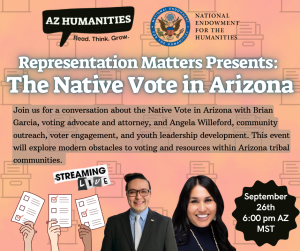
Join us for a conversation about the Native Vote in Arizona with Brian Garcia, voting advocate and attorney, and Angela Willeford, community outreach, voter engagement, and youth leadership development advocate. This event will explore modern obstacles to voting and resources within Arizona tribal communities.
Right to Vote: The Struggle for Native American Voting Rights
Join us for a deep dive into the history of Native American voting rights with Cora Tso, Senior Research Fellow at the ASU’s Kyl Center for Water Policy, and Brian Garcia, voting rights advocate and attorney. This event explores the struggles, triumphs, and ongoing efforts surrounding Native American voting rights, shedding light on a vital aspect of American democracy often overlooked.
Cora Tso is a Senior Research Fellow at Arizona State University (ASU)’s Kyl Center for Water Policy. Cora works to research, analyze, and develop recommendations related to Tribal water policy. Previously, Cora has worked with governmental, private, and non-profit organizations focusing on Indian law and environmental law and policy matters. Cora is an enrolled member of the Navajo Nation. She is of the Reed People clan and born for the Black Streaked Wood clan. Her maternal grandparents are of the Bitterwater clan and her paternal grandparents are of the Red House clan. She was born and raised on the Navajo reservation and is originally from Shonto, Arizona.
Brian Garcia (Pascua Yaqui) is the Co-Founder of Indigenous Impact Arizona (“IIAZ”), which is dedicated to cultivating political power to increase indigenous representation in government, support civic engagement, and building an indigenous data hub. Previously, Brian was a Staff Attorney at the Florence Immigrant & Refugee Rights Project, and has worked for the U.S. House of Representatives, the Salt River Pima-Maricopa Indian Community, the Pascua Yaqui Tribe, and the Arizona Secretary of State. Brian also served on the Tempe Union High School District Governing Board where they represented over 12,000 students, 1,300 staff, and over 160,000 residents.
Racial Innocence: Unmasking Latino Anti-Black Bias and the Struggle for Equality with Tanya Kateri Hernandez
What happens when there is racial diversity within an ethnic community? Can people who experience systemic discrimination also perpetuate discrimination? Race relations in marginalized communities are complex. Join us for a program with law professor and anti-discrimination expert, Tanya Katerí Hernández, author of Racial Innocence: Unmasking Latino Anti-Black Bias and the Struggle for Equality. Hernández will discuss the hidden history of Afro-Latinos, the challenges they face in the Latino community, and how we can forge a path toward a just and equitable society.
About the Speaker:
Tanya Katerí Hernández is the Archibald R. Murray Professor of Law at Fordham University School of Law. Professor Hernández is an internationally recognized comparative race law expert and Fulbright Scholar who has visited at the Université Paris Ouest Nanterre La Défense, in Paris and the University of the West Indies Law School, in Trinidad. She has previously served as a Law and Public Policy Affairs Fellow at Princeton University, a Faculty Fellow at the Institute for Research on Women at Rutgers University; a Faculty Fellow at the Fred T. Korematsu Center for Law and Equality, and as a Scholar in Residence at the Schomburg Center for Research in Black Culture. Professor Hernández is a Fellow of the American Bar Foundation, the American Law Institute, and the Academia Puertorriqueña de Jurisprudencia y Legislación. Hispanic Business Magazine selected her as one of its annual 100 Most Influential Hispanics. Professor Hernández serves on the editorial boards of the Revista Brasileira de Direito e Justiça/Brazilian Journal of Law and Justice, and the Latino Studies Journal published by Palgrave-Macmillian Press. Read more here.
Humans of St. Louis: The Story Behind the Stories
How do we tell stories about our community? What do these stories tell us about local needs, issues, and experiences? Join us for a conversation with Humans of St. Louis (HOSTL) co-founder, lead storyteller, and book author, Lindy Drew, who documents the people of her city through photography and first-person stories. Her work highlights the human experience and shines a light on broader topics, from health and education to racial equity. Drew will share details about approaching, interviewing, and photographing strangers on the street, and what crafting original and local content in the HOSTL style has meant for her audience. She’ll talk about professional and personal experiences storytelling since Ferguson and through the pandemic up until now, and how social work, public health, and documentary portraiture play crucial roles in her body of work. Finally, through published examples, she’ll teach how to approach and invite people to tell their own stories, how to ask better questions, and how to be a better listener.
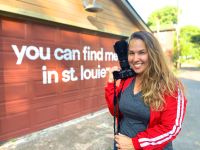 After studying at the University of Arizona and the International Center of Photography, Lindy traveled for three years in Latin America to share people’s stories in the spirit of documentary photography. Upon returning to the U.S., she worked with Casa de Sueños in Phoenix to help care for unaccompanied undocumented minors and reunify them with their family in the states. Lindy graduated in May 2016 from the Brown School at Washington University in St. Louis with a Masters of Social Work and Public Health. During her education, she co-founded Humans of St. Louis to have a creative break from classes while getting to better know St. Louis from meeting people on the street. By engaging strangers in insightful personal interviews, the HOSTL team and her produce visual stories that represent part of the larger community conversations and regional development taking place in St. Louis. Lindy produces new content for HOSTL’s online presence, presents about the art of storytelling, and manages the book project’s local creative content team.
After studying at the University of Arizona and the International Center of Photography, Lindy traveled for three years in Latin America to share people’s stories in the spirit of documentary photography. Upon returning to the U.S., she worked with Casa de Sueños in Phoenix to help care for unaccompanied undocumented minors and reunify them with their family in the states. Lindy graduated in May 2016 from the Brown School at Washington University in St. Louis with a Masters of Social Work and Public Health. During her education, she co-founded Humans of St. Louis to have a creative break from classes while getting to better know St. Louis from meeting people on the street. By engaging strangers in insightful personal interviews, the HOSTL team and her produce visual stories that represent part of the larger community conversations and regional development taking place in St. Louis. Lindy produces new content for HOSTL’s online presence, presents about the art of storytelling, and manages the book project’s local creative content team.
Reframing American History through the Japanese Experience: A Conversation about Community Storytelling
As Americans grapple with increasing tension and division, what can we learn from the past to connect with each other? Arizona has a rich history with Japanese Americans since the 19th century. Hundreds of acres of the land were once owned by Japanese-American farmers who created thriving agriculture communities, producing and delivering products across and beyond the state. During WWII, Arizona had two concentration camp sites where Japanese Americans were incarcerated. Traces of those histories are disappearing from public view. Filmmaker and educator Reina Higashitani works with student junior producers Catherine Baxter and Tinnley Subsin to document those stories. Their podcast series, Chasing Cherry Blossoms, and its interactive website connect firsthand accounts of history with contemporary experiences and prompt discussions such as model minority myth, perpetual foreignness, and legacies of resistance. Join them in a discussion of the power of community storytelling and explore what it means to be an American today.
Reina Higashitani, Producer, is a Japanese filmmaker and an assistant professor at Arizona State University, the Sidney Poitier New American Film School. She has produced over fifty independent films, media projects, and TV documentaries including the Academy Award-nominated documentary “Redemption,” Sundance Film Festival official selection “Kusama-Infinity,” “No Contract, No Cookies”(HBO), and a Tokyo Video Festival Excellence Award-winning documentary “Shall We Sing?”(PBS and KTV), which she also directed. She also led various media workshops and mentorship programs for underrepresented youth and people with disabilities in local communities. Higashitani is committed to educating new visual storytellers with passion and an inclusive mindset.
Catherine Jie Baxter, Junior Producer, is a senior at Arizona State University in Herberger Arts, Media, and Engineering School and Barrett, The Honors College. She is a Digital Culture Media Processing major and hopes to become an audio engineer after graduation. She is a first-generation Chinese immigrant, having been adopted from China as a baby. She is hoping to gain new, applicable skills as well as a chance to find answers to her own sense of identity as a Chinese-American.
Tinnley Sawan Subsin, Junior Producer, is a senior at Arizona State University studying Medical Microbiology with a minor in Writing, Rhetorics, and Literacies. She’s biracial as her father’s side of the family immigrated from Thailand. She was born and raised in Arizona and although she identifies as Asian-American, she often feels disconnected from Thai culture. She is interested in hearing other people’s experiences with finding their identities and learning how she could apply their advice to her own journey.
The Art of Drag with David Boyles and Felicia Minor
The Art of Drag — a performance of exaggerated gender expression intended to highlight the performative aspect of gender –has never been more popular or controversial than it is today. In this two-part program, David Boyles, ASU Professor and Drag Story Hour Arizona President, will discuss the history of drag, and legendary and award-winning performer Felicia Minor will share what it is like to be a drag performer today. Professor Boyles will present a brief history of the art form of drag performance, told through the stories of a dozen of the most important figures in drag history, from William Dorsey Swann, who was born into slavery and went onto become America’s first known drag queen, to Jose Sarria, the San Francisco drag performer who became the first openly LGBTQ+ person to ever run for public office. Felicia Minor will discuss her nearly 15 years as a mainstay of the Phoenix drag scene and what it is like to be a drag artist in 2023.
David Boyles (pronouns: he/they) teaches writing and rhetoric at Arizona State University, where they also developed the Discovery Seminar course, “Speaking OUT: LGBTQ+ Youth in Pop Culture and Politics.” They are co-founder and president of Drag Story Hour Arizona and were honored for their contributions to the Phoenix LGBTQ+ community with the 2022 Phoenix Pride John Bircumshaw Community Spirit Award. They are also the author of the recently published Young Adult novel Life is a Banquet.
Felicia Minor is a vibrant and talented drag queen, entertainer, co-host, producer, and social media guru. She has won various titles and awards, including Miss Gay Supernova USofA Newcomer 2011, and Fascinations Best Drag Queen honor at Raven Events’ Annual Red Light District Costume Ball. She co-hosts and produces the popular YouTube show, “Let’s Have a Fefe” with Arizona’s Most Decorated King, Freddy Prinze Charming. She is also a storyteller for the Drag Story Hour Arizona chapter and currently serving on the board of Drag Story Hour’s national chapter. She has also been featured as the official billboard diva for the LGBTQ Consortium and participated in RipplePHX’s Ripple Briefs campaign. Felicia Minor has participated in “Jail & Bail” with the local March of Dimes chapter and is always eager to do more to make a positive impact on the world.
Beyond the Binary: A History of Gender and Sexual Fluidity
Many people are confused by the seeming influx of new terms to describe gender and sexuality that have emerged in the last decade: nonbinary, genderfluid, genderqueer, pansexual, polysexual, and so on. But fluid conceptions of gender and sexuality (those that fall outside the binary concepts of male/female or heterosexual/homosexual) have been around for a long time. And for as long as they have been around, they have complicated attempts to organize human sexuality and gender into clear boxes. Join us for a look at the history of nonbinary gender and sexual identities across cultures and the often-fraught attempts to organize and understand these identities, from the nadleehi of the Navajo Nation to modern celebrities such as Janelle Monae and Jonathan Van Ness.
David Boyles (pronouns: he/they) teaches writing and rhetoric at Arizona State University, where they also developed the Discovery Seminar course, “Speaking OUT: LGBTQ+ Youth in Pop Culture and Politics.” They are co-founder and president of Drag Story Hour Arizona and were honored for their contributions to the Phoenix LGBTQ+ community with the 2022 Phoenix Pride John Bircumshaw Community Spirit Award. They are also the author of the recently published Young Adult novel Life is a Banquet.
Voicing Native Stories: Media Misrepresentations of Indigenous Identity with Dr. Melissa Greene-Blye
Non-Native news media too often fail to offer authentic representation of Indigenous identity, issues, and individuals. Media representations in the modern moment fall prey to a legacy of stereotyping established by long-ago editors and publishers, in part due to issues around naming and labeling, but, most importantly, because Native people are not given a voice in their own stories. How do Indigenous people fit into the larger story of America’s past, present, and future? How have narrative formulas and journalistic conventions silenced Native voices and perpetuated misrepresentations? What can we do to offer a more authentic representation of Indigenous people in history and in journalism? Join us for a program with Dr. Melissa Greene-Blye as we reconsider historical and contemporary representations of Indigenous people in media and journalism.
Melissa Greene-Blye is a citizen of the Miami Tribe of Oklahoma. Her research examines journalistic representations and negotiations of American Indian identity past and present. Most recently, her work has been published in Journalism History. Melissa worked as an anchor and reporter during 20 years in the news business covering local news in television markets big and small. She enjoys using her knowledge and experience to educate the newest generation of journalists.
LGBTQ+ Representation in Pop Culture & Politics: Q&A with David Boyles
From music artists like Lil Nas X to TV dramas like Euphoria, the LGBTQ+ community, and their stories and experiences, are more visible now in popular culture than ever before. In many ways the rise in LGBTQ+ representation parallels the movement for LGBTQ+ representation in the 1970’s. What was happening to culture and politics during the 1970’s? What is happening today? Has the inclusion of the LGBTQ+ community in pop culture influenced our current political landscape? Join us for a Q&A discussion with David Boyles, co-founder of Drag Story Hour Arizona, as we talk about the intersection of LGBTQ+ representation in pop culture and politics, from past to present.
David Boyles (pronouns: he/they) teaches writing and rhetoric at Arizona State University, where they also developed the Discovery Seminar course, “Speaking OUT: LGBTQ+ Youth in Pop Culture and Politics.” They are co-founder and president of Drag Story Hour Arizona and were honored for their contributions to the Phoenix LGBTQ+ community with the 2022 Phoenix Pride John Bircumshaw Community Spirit Award. They are also the author of the recently published Young Adult novel Life is a Banquet.
LGBTQ+ Representation in the Media, Then and Now with David Boyles
Across the country, battles are being fought about the exposure of young people to LGBTQ+ representation in schools. Some schools have Gay-Straight Alliance clubs and other activities, so that all young people are represented and engaged. Other schools argue that this is harmful to young people, and expressly ban books, topics and discussions that represent the LGBTQ+ community. Shouldn’t schools represent all types of young people and family structures? What happens when they do not? How is the health and welfare of young people impacted by identity politics? Join us for a talk with David Boyles as we examine together the history of the representation of the LGBTQ+ community from the 1970’s to the present in the media and popular culture, and consider the politization of conversations in the classroom. How can we learn to acknowledge the identity of LGBTQ+ youth and have meaningful conversations across political divides?
David Boyles (pronouns: he/they) teaches writing and rhetoric at Arizona State University, where they also developed the Discovery Seminar course, “Speaking OUT: LGBTQ+ Youth in Pop Culture and Politics.” They are co-founder and president of Drag Story Hour Arizona and were honored for their contributions to the Phoenix LGBTQ+ community with the 2022 Phoenix Pride John Bircumshaw Community Spirit Award. They are also the author of the recently published Young Adult novel Life is a Banquet.
The State of Democracy and The Pursuit of Justice with Masha Gessen
Watch the recording on ASU Live here.
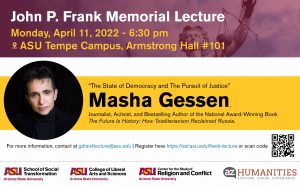
This program was hosted by the ASU School of Social Transformation in partnership with the ASU Center for the Study of Religion and Conflict and Arizona Humanities.
History in Real Time: Asian Americans Fight Back in the Age of COVID with Renee Tajima-Peña
Join Academy Award-nominated documentary filmmaker and activist Renee Tajima-Peña as she connects the rise of anti-Asian violence with the history of Asians in the United States: facing hate, fighting for justice, and shaping the American story. Learn more about the untold stories of the Asian American experience with Renee and Arizona Humanities.
Renee Tajima-Peña chronicles the American scene through documentary films that tell the story of immigrant communities, race, gender, and social justice. Her films include Who Killed Vincent Chin? My America…or Honk if You Love Buddha, Calavera Highway, Skate Manzanar, Labor Women, No Más Bebés. She is the series producer and showrunner of the PBS docuseries, Asian Americans, which explores the Asian American experience. Her work has screened at worldwide film festivals and venues such as Cannes, Hawaii, Hong Kong, London, New Directors/New Films, Sundance, and the Whitney Biennial. She has been awarded the Guggenheim Fellowship, USA Broad Fellowship, and the Alpert Award in the Arts, among many others. Renee also co-founded the May 19 Project, a social media campaign focusing on the legacy of AAPI solidarity with other communities. Renee is currently Professor of Asian American Studies at UCLA, where she is director of the Center for EthnoCommunications and holds an endowed chair in Japanese American studies.
Civic Participation in Our Democracy–Is Citizenship Required? with Angela Banks
The Representation Matters series promotes civic education and encourages program participants to be engaged citizens. But who gets to be a citizen? Millions of immigrants are woven into the fabric of increasingly diverse communities across our country. Although many lack citizenship status, they participate in the economic, political, and social life of our democracy. How should we define national membership during times of significant migration? What are the boundaries of citizenship? What does participation in our democracy look like beyond citizenship status? Join us for a conversation with ASU Law Professor Angela Banks about the history of citizenship and explore the variety of forms of membership in our democracy.
Angela Banks is the Charles J. Merriam Distinguished Professor of Law at the Sandra Day O’Conner College of Law at Arizona State University. Prior to joining ASU, she was Professor of Law at William & Mary School of Law. Professor Banks is an expert on immigration and citizenship. Her research focuses on membership and belonging in democratic societies, and her work has appeared in numerous law review journals. She is the author of Civic Education in the Age of Mass Migration: Implications for Theory and Practice, which offers educators an inclusive approach to teaching civic education in diverse classrooms and a new way to conceptualize membership in our democracy regardless of citizenship or immigration status.
Petitioning for Freedom: Habeas Corpus in the American West with Dr. Katrina Jagodinsky
Throughout history the U.S. legal system has controlled and regulated the lives of people in marginalized communities. Perhaps less known is that some people were able to successfully challenge these injustices using the very same legal system. Petitioners have opposed enslavement, deportation, federal Indian agents and much more, using the constitutional protection of habeas corpus. What is habeas corpus? How did Black, Indigenous, and immigrant petitioners in the American West, including Arizona, effectively use this legal right in the 19th and early 20th century? What impact does habeas corpus have today? Join us as Dr. Katrina Jagodinsky explores stories of people petitioning for freedom in the U.S.
ABOUT THE SPEAKER:
Katrina Jagodinsky is Associate Professor of History at the University of Nebraska – Lincoln. Her research examines the lives and legal history of marginalized people in the 19th– and 20th-century American West. She has published extensively on the history of Indigenous and mixed-raced women leveraging the American legal system to assert their freedom. Her first book, Legal Codes & Talking Trees: Indigenous Women’s Sovereignty in the Sonoran and Puget Sound Borderlands, 1854-1946, tells the stories of Indigenous women’s fight to protect themselves and their land within an oppressive legal system. Most recently, Dr. Jagodinsky has received funding from the National Science Foundation for her research project: Petitioning for Freedom: Habeas Corpus in the American West.
Where Do You Live? How Did You Get There?: Housing Segregation in America with Dr. Rashad Shabazz
Everybody needs a place to live, but not everyone gets to live where they want to. Who lives in your neighborhood? Who doesn’t live in your neighborhood? For many decades American cities have been divided by race. This was not caused indirectly by individual or organizational actions or prejudices, but deliberately through laws and policies of local, state and federal governments. Today we can see how a long history of discriminatory housing policies has determined who can purchase and own homes, and where people can live. Beginning in the 1930s, color-coded maps drawn along racial lines, a practice known as redlining, became a tool to regulate who could qualify for home loans. More recently, subprime mortgage practices that targeted minority borrowers leading up to the 2008 housing crisis have continued to define access to homeownership by race. How do these policies impact our lives and communities? Join us for an interactive discussion on the history of housing segregation in the U.S. and its lasting impact on the geography of our cities.
ABOUT THE SPEAKER:
Rashad Shabazz is Associate Professor in the School of Social Transformation and the School of Geographical Sciences & Urban Planning at Arizona State University. His teaching and research include race relations, social justice movements, and the relationship of race and place. He is the expert on how race, sexuality, and gender are informed by geography. With an interdisciplinary approach, his academic work brings together human geography, Black cultural studies, gender studies, and critical prison studies. Dr. Shabazz’s most recent book publication, Spatializing Blackness (2015), examines the impact of carceral power on the geographies of African Americans in Chicago’s South Side.
Unpacking Critical Race Theory with Dr. Rashad Shabazz
The media and the public are abuzz on the topic of critical race theory (CRT). But why now? The concept known as critical race theory has been around for decades. Critics argue that CRT fosters divisions among groups of people. Proponents assert that CRT addresses racial inequalities. What exactly is critical race theory? How did this academic theory born in the 1970s become so widely known today? How does a critical race theory lens impact the way people learn and understand culture and history? Join us for a conversation with Dr. Rashad Shabazz as he unpacks terms, dispels misconceptions, and explains the origins and evolution of critical race theory.
ABOUT THE SPEAKER:
Rashad Shabazz is Associate Professor in the School of Social Transformation and the School of Geographical Sciences & Urban Planning at Arizona State University. His teaching and research include race relations, social justice movements, and the relationship of race and place. He is the expert on how race, sexuality, and gender are informed by geography. With an interdisciplinary approach, his academic work brings together human geography, Black cultural studies, gender studies, and critical prison studies. Dr. Shabazz’s most recent book publication, Spatializing Blackness (2015), examines the impact of carceral power on the geographies of African Americans in Chicago’s South Side.
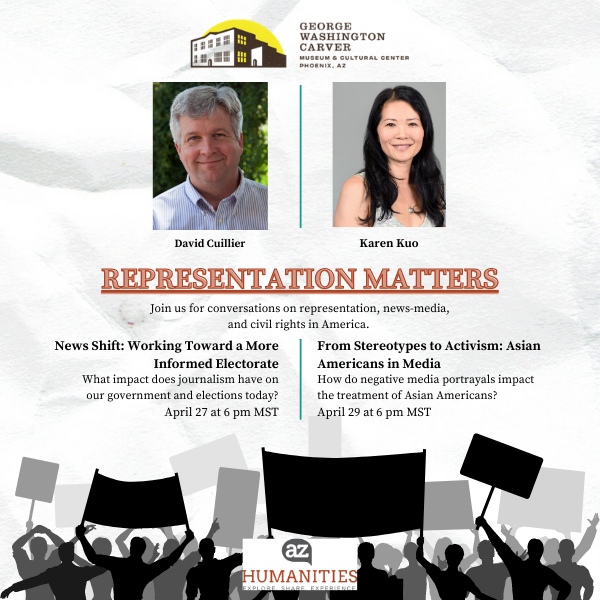
News Shift: Working Toward a More Informed Electorate
Never before has the nature of news changed so quickly and dramatically than now, driven by a crumbling economic model, “#FakeNews” attacks, “filter bubbles,” and declining public support. What is the state of journalism today? What is its impact on government and elections? Many forces can threaten or undermine an independent press. What are potential solutions for saving quality journalism for the good of citizens and civic engagement? How can we build a strong and sustainable civic information ecosystem for the sake of our communities and society as a whole? Join us for an important conversation about journalism today, and learn how to become a savvy and discerning media consumer.
About the Speaker:
David Cuillier, Ph.D., is an Associate Professor at the University of Arizona School of Journalism, president of the National Freedom of Information Coalition, and a board member of the First Amendment Coalition of Arizona. He is a former newspaper journalist from the Pacific Northwest and served as director of the UA School of Journalism for seven years. He was national president of the Society of Professional Journalists in 2013-14 and received the organization’s highest honor, the Wells Key, for his work in advocating for press freedom nationally. He has testified three times before Congress regarding the Freedom of Information Act, and is currently editor of the peer-reviewed Journal of Civic Information.
From Hollywood Stereotypes to Social Activism: Asian Americans in the Media
Perceptions of Asian Americans have long been shaped by stereotypes perpetuated by the media. We have seen the “model minority,” “asexual nerd,” “sexually submissive mistress,” “tongue-tied immigrant,” and “kung-fu master” portrayals in movies, cartoons, books, and news for decades. These stereotypes reflect historical inaccuracies, and embody racist, sexist and misogynist characterizations of Asian American women and men. How do these negative and reductive media portrayals impact the treatment of Asian people today? Have media stereotypes contributed to the rise in anti-Asian hate crimes? How is the Asian American community responding? This virtual talk will examine the history of Asian American stereotypes in the media, from old Hollywood to the present, and explore Asian American activism today.
About the Speaker:
Karen Kuo, Ph.D., is an Associate Professor of Asian Pacific American Studies in the School of Social Transformation at Arizona State University. Her fields of interest include literary and cinematic studies and social and cultural theories of race, gender, and sexuality. Her book, East is West and West is East: Gender, Culture, and Interwar Encounters between Asia and America (Temple University Press, November, 2012) examines the geopolitical imaginaries of US orientalism in film and literature during the interwar period. Her two current projects include an edited anthology on Taiwanese Americans, Remembering the Beautiful Island: Critically Considering Transnational Taiwanese/America, and a monograph on representations and discourses of reproduction and mental illness through Asian/American women’s narratives. Dr. Kuo also actively works within the APA community in Arizona by giving presentations about the role of Asian Americans and Pacific Islanders in US history and culture.

Who is American? The Story of Chinese Americans in the United States
Chinese Americans have a long and complex history in the United States. Chinese people first immigrated to the U.S. in 1815. Since then they have contributed to all aspects of American life, business, science, arts, culture and more. Despite over a century of contributions Chinese Americans are often still treated as outsiders. When do immigrants become Americans? What does it mean to be an American citizen? Who gets to decide? How has the question of who is American changed over time? Join us as we explore the story of Chinese immigrants and their path to citizenship and civil rights in the United States.
About the Speaker:
Karen J. Leong, Ph.D., is an Associate Professor of Women and Gender Studies and Asian Pacific American Studies in the School of Social Transformation at Arizona State University. She received her doctorate in US History from UC Berkeley, and has been at ASU since 1999. Her book, The China Mystique: Pearl S. Buck, Mayling Soong Chiang, Anna May Wong and the Transformation of American Orientalism was published by University of California Press in 2005. As with most of her research and teaching, it explores the intersections of gender, race, class, and nation by analyzing how these three very public women came to represent China to Americans during the 1930s and 40s. Her current research projects address Japanese American experiences in transnational Arizona, federal Japanese American and American Indian relocation policies, and Asian American and Pacific Islander women’s sexual health.
Who Gets to Vote? A Discussion of Voting Rights Today
Dozens of new voting measures have been introduced this year in Arizona and across the country. Why do these voting bills matter? Do they protect or suppress the public’s access to vote in local and national elections? How exactly does the electoral process work, and what will it look like in the future? Join us for a comprehensive examination of voting rights and voting and election laws in the U.S. from the past to present day.
About the Speaker:
Joshua Sellers, J.D., Ph.D., is an Associate Professor of Law in the Sandra Day O’Connor College of Law at Arizona State University. He received his J.D. and Ph.D. in Political Science from the University of Chicago. Prior to joining the ASU faculty, he was an Associate Professor at the University of Oklahoma College of Law, and a Postdoctoral Fellow in Law and Politics at Syracuse University’s Maxwell School of Citizenship and Public Affairs. His principal areas of research and teaching are election law, legislation and regulation, constitutional law, and civil procedure. His scholarship has been published or is forthcoming in the NYU Law Review, Vanderbilt Law Review, and Stanford Law Review, among others.
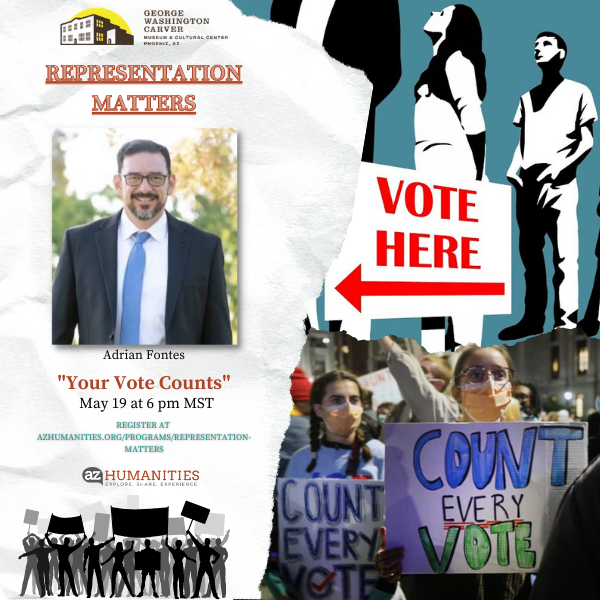
Your Vote Counts
The right to vote is fundamental to democracy in the United States. So why is voting in the news every day? Why is voting in local and national elections important? How has the voting process changed over time? What is happening with voting in Arizona? What is the role of the County Recorder in the election process? Join us for a lively conversation with former Maricopa County Recorder, Adrian Fontes. Fontes will discuss the County Recorder’s duties, the registration and voting process, technological changes, and the experience of voters, young and old, from all backgrounds, across Arizona. Can the process be improved? Let’s talk about why voting matters.
About the Speaker:
Adrian Fontes was the 29th Maricopa County Recorder and is an attorney and an Honorably Discharged veteran of the United States Marine Corp. During his term as the Maricopa County Recorder, Fontes saw a half-million voter increase in the county’s voter registration rolls. His efforts to make improvements in the election system resulted in an increase of 600,000 voters in 2020. Fontes has been the recipient of national awards for innovation in technology from the National Association of County Officials and a Clearing House Award from the Federal Election Assistance Commission. Widely recognized for his bipartisanship and dedication to the fundamental rights of voters and ensuring access for all US citizens, Fontes now serves as the Chief Deputy Recorder in Tucson, Arizona.
This program was funded by the “Why it Matters: Civic and Electoral Participation” initiative, administered by the Federation of State Humanities Councils and funded by the Andrew W. Mellon Foundation.
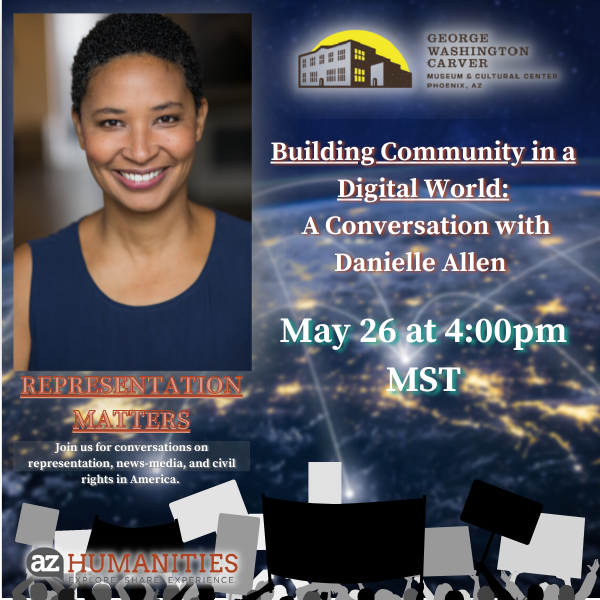
Building Community in a Digital World: A Conversation with Danielle Allen
Moderated by Matthew Whitaker
Social media and the internet have fundamentally changed the way we consume news and interact with each other. Conversations once held face-to-face may now be conducted online, and reach audiences in our own communities, our nation, and the world. How has social media shaped the way we build communities? How has the digital age affected social activism and civic participation? To what degree are social media platforms influencing national dialogue? Some would argue that online movements have led to mainstream visibility and public demands for change, such as police and immigration reform. Others would argue that online movements have contributed to polarization and violence, such as the storming of the U.S. Capitol. Has social media strengthened or weakened democracy in the U.S.? What will civic participation and our democracy look like in the future? Join us for a timely conversation about civic participation in the digital age with Danielle Allen, Harvard University Professor and the Director of Harvard’s Edmond J. Safra Center for Ethics.
About the Speaker:
Danielle Allen is a brilliant and award-winning political theorist. She is the James Bryant Conant University Professor at Harvard University, and has published broadly in democratic theory, political sociology, and the history of political thought. Allen is widely known for her work on justice and citizenship in ancient Athens and modern America. Allen examines history with a uniquely modern lens. She underscores the historic connection between democracy in the United States and “civic agency,” the bridge to building and shaping communities today that embody diversity and equality. Allen is the 2020 recipient of the prestigious John W. Kluge Prize for Achievement in the Study of Humanity, and the author of many books including Talking to Strangers: Anxieties of Citizenship since Brown vs. the Board of Education (2004), Our Declaration: A Reading of the Declaration of Independence in Defense of Equality (2014), and Education and Equality (2016). She is the co-editor of the award-winning Education, Justice, and Democracy (2013) and From Voice to Influence: Understanding Citizenship in the Digital Age (2015).
About the Moderator:
Matthew Whitaker is a celebrated educator, historian, social justice advocate, and founder of the ASU Center for the Study of Race and Democracy, where he taught for 16 years. Whitaker is an expert in U.S. and African American history, race relations, social movements, and cultural competency. Whitaker’s numerous awards for teaching/training excellence include the 2016 DLA Diversity and Inclusion Award, ASU’s 2015 Pioneer Award for work on African American life and culture, and 2014 DLA Inclusive Workplace Award. Whitaker speaks throughout the U.S. and abroad, and has been featured on CNN, NPR, and PBS. His books include Hurricane Katrina: America’s Unnatural Disaster, Race Work: The Rise of Civil Rights in the Urban West, and his forthcoming memoir, The Undisputed Truth: A Revolutionary Journey to Black Manhood.
Recording not available for this event.
This program was funded by the “Why it Matters: Civic and Electoral Participation” initiative, administered by the Federation of State Humanities Councils and funded by the Andrew W. Mellon Foundation.
